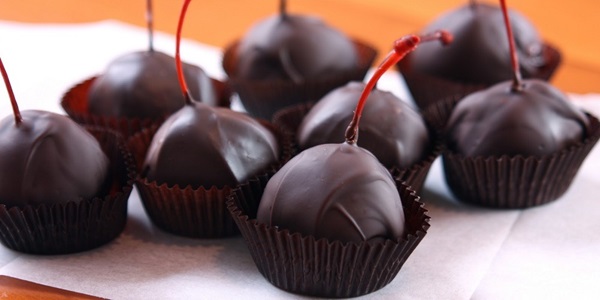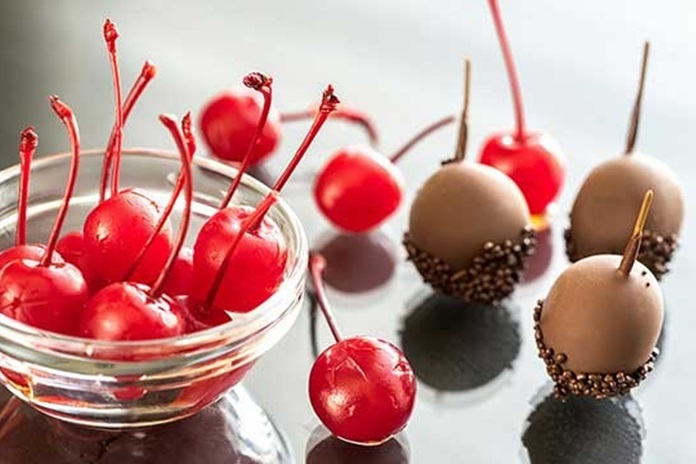National Chocolate Covered Cherry Day is celebrated on January 3. The day is all about enjoying the tasty combination of cherries and chocolate. It’s a great time to enjoy this sweet treat after the holiday season ends and a new year starts. Celebrating this day makes everyone happy and gives us something to look forward to in the coming year.
History of National Chocolate Covered Cherry Day
Chocolate-covered cherries which are also known as cherry cordials, have been a favourite treat for many years. When Europeans first came to America in the 1600s, they loved cherries so much that they brought some with them on their ships across the Atlantic Ocean.
Moreover, most people believe that cherries originally came from Turkey though there are many types of cherries native to North America now. Likewise, cherries are one of the oldest crops grown by people. It shows that our love for them has been a part of human culture for a long time.
Likewise, during the 1700s, the English began soaking sweet cherries in kirsch, a cherry brandy;, and covering them with chocolate. These treats, known as cordials, were enjoyed for their rich flavours and saved for special occasions.
Furthermore, around the same time, the French made a similar treat called Griottes, using sour cherries soaked in kirsch and coated in chocolate. Both English cordials and French Griottes quickly became popular when they arrived in America in the 1700s.
In America, people began making cherry cordials by soaking whole cherries in a sweet syrupy liqueur made of sugar and brandy, then covering them with chocolate. While other fruits were also used to make cordials, cherries were the most popular and often enjoyed during holidays and special events.

During Prohibition, when alcohol was banned, the recipe changed to use cherry-flavoured sugar syrup instead of brandy. By 1929, chocolate-covered cherries made with sugar syrup were being mass-produced in the U.S. to satisfy growing demand.
Nowadays, we celebrate all kinds of chocolate-covered cherries whether they are made with dark, milk, or white chocolate. We enjoy a cherry cordial made with sweet liqueurs and a touch of Kirsch brandy after dinner. Similarly, we also love a sweet cherry covered in chocolate and sugar syrup as a treat in the afternoon. No matter which one you like best, make sure to enjoy some for National Chocolate Covered Cherry Day.
Timeline of National Chocolate-Covered Cherry Day
| 1985 (New York City) | Tootsie Roll Industries, Inc. purchases Cella’s Confections, Inc. and continues to sell the popular confection under the Cella brand name. |
| 1948 (Chicago) | Rival confectioner Queen Anne’s Cordial Cherry is introduced and begins commercially manufacturing chocolate-covered cherries. |
| 1929 (New York City) | Cella is the first confectioner to commercially manufacture chocolate-covered cherries on a large scale. |
| 1864 (New York City) |
Italian immigrant confectioner Angelo Cella begins making cherry cordials in America. |
Five Interesting Facts About Cherries
- Variety of Colors: While red cherries are the most common, they can also come in a range of colours including yellow and almost black. The color can vary depending on the variety, such as the yellow Rainier cherries or the deep purple Bing cherries.
- Pits Are Useful: Cherry pits, while not edible, can be repurposed. They can be cleaned, dried, and used as natural heating pads. When warmed up, they retain heat and can be used to soothe sore muscles or keep warm in bed.
- Pollination Pals: Cherry trees often require cross-pollination to produce fruit, which means they need pollen from another cherry tree to set fruit. This is usually done by bees and other insects. Some varieties are self-pollinating, but many benefit from having multiple trees nearby.
- Symbolic Significance: In Japan, cherry blossoms, or “sakura,” hold significant cultural value and symbolize the fleeting nature of life. The cherry blossom season is celebrated with festivals and viewing parties, emphasizing the beauty and transient nature of life.
- Cherry Festivals: Around the world, cherry harvests are celebrated with festivals. For example, the Cherry Blossom Festival in Washington, D.C., celebrates the blooming of cherry trees gifted by Japan in 1912, while Traverse City, Michigan, hosts the National Cherry Festival each summer to celebrate their local cherry industry.
Conclusion
National Chocolate Covered Cherry Day offers a delightful way to welcome the new year with a sweet indulgence rooted in history and tradition. From their origins in Europe to their popularity in America, chocolate-covered cherries have evolved into a versatile treat enjoyed in many forms. Whether you prefer them with a boozy twist or just covered in rich chocolate, these cordials remind us of simple pleasures that have stood the test of time. So, on January 3, embrace the joy that comes from biting into this classic treat and celebrate a day dedicated to one of life’s sweetest combinations.
Frequently Ask Question
Where did chocolate-covered cherries originate?
The origins of chocolate-covered cherries trace back to Europe. In the 1700s, the English began soaking sweet cherries in cherry brandy called kirsch and covering them with chocolate. The French also created a similar treat called Griottes, using sour cherries soaked in kirsch and coated in chocolate.
How did chocolate-covered cherries become popular in America?
Chocolate-covered cherries became popular in America in the 1700s when both English cordials and French Griottes were introduced. American confectioners adapted the recipe, using sweet syrups and brandy to make their versions, which became a beloved holiday treat.
How did chocolate-covered cherries change during Prohibition?
During Prohibition, when alcohol was banned in the U.S., the traditional recipe for chocolate-covered cherries was altered. Instead of using brandy, confectioners began using cherry-flavoured sugar syrup, making the treat alcohol-free but still delicious.
You may also like to read, Cook Something Bold and Pungent Day – November 8, 2024
